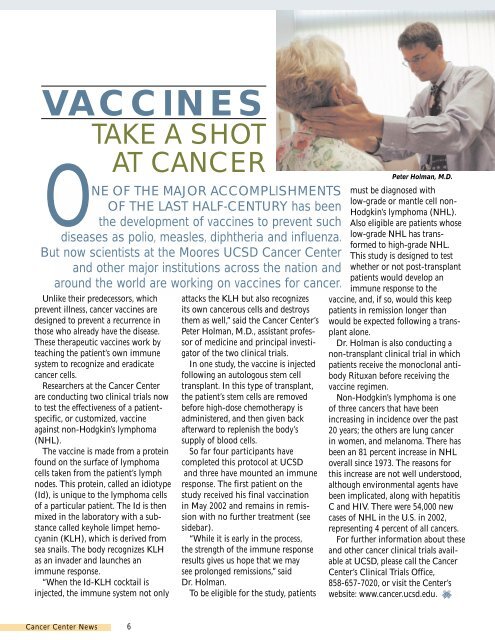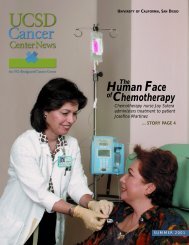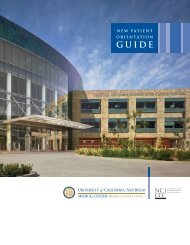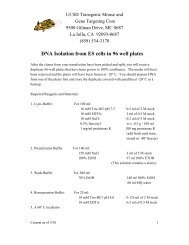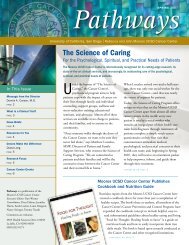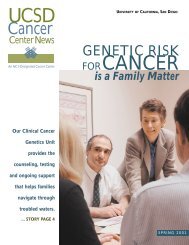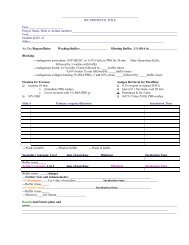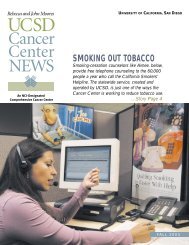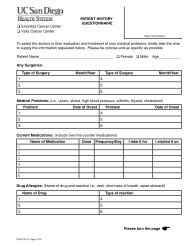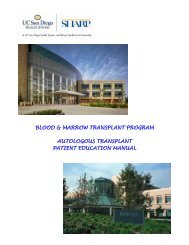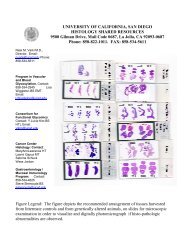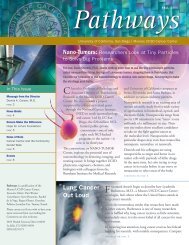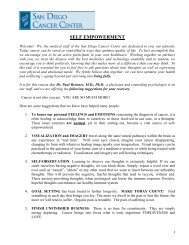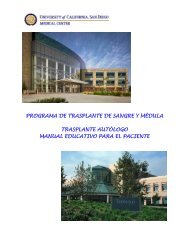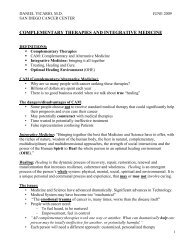PROTEIN TRANSDUCTION: - Moores Cancer Center
PROTEIN TRANSDUCTION: - Moores Cancer Center
PROTEIN TRANSDUCTION: - Moores Cancer Center
You also want an ePaper? Increase the reach of your titles
YUMPU automatically turns print PDFs into web optimized ePapers that Google loves.
VACCINES<br />
TAKE A SHOT<br />
AT CANCER<br />
ONE OF THE MAJOR ACCOMPLISHMENTS<br />
OF THE LAST HALF-CENTURY has been<br />
the development of vaccines to prevent such<br />
diseases as polio, measles, diphtheria and influenza.<br />
But now scientists at the <strong>Moores</strong> UCSD <strong>Cancer</strong> <strong>Center</strong><br />
and other major institutions across the nation and<br />
around the world are working on vaccines for cancer.<br />
Unlike their predecessors, which<br />
prevent illness, cancer vaccines are<br />
designed to prevent a recurrence in<br />
those who already have the disease.<br />
These therapeutic vaccines work by<br />
teaching the patient’s own immune<br />
system to recognize and eradicate<br />
cancer cells.<br />
Researchers at the <strong>Cancer</strong> <strong>Center</strong><br />
are conducting two clinical trials now<br />
to test the effectiveness of a patientspecific,<br />
or customized, vaccine<br />
against non-Hodgkin’s lymphoma<br />
(NHL).<br />
The vaccine is made from a protein<br />
found on the surface of lymphoma<br />
cells taken from the patient’s lymph<br />
nodes. This protein, called an idiotype<br />
(Id), is unique to the lymphoma cells<br />
of a particular patient. The Id is then<br />
mixed in the laboratory with a substance<br />
called keyhole limpet hemocyanin<br />
(KLH), which is derived from<br />
sea snails. The body recognizes KLH<br />
as an invader and launches an<br />
immune response.<br />
“When the Id-KLH cocktail is<br />
injected, the immune system not only<br />
attacks the KLH but also recognizes<br />
its own cancerous cells and destroys<br />
them as well,” said the <strong>Cancer</strong> <strong>Center</strong>’s<br />
Peter Holman, M.D., assistant professor<br />
of medicine and principal investigator<br />
of the two clinical trials.<br />
In one study, the vaccine is injected<br />
following an autologous stem cell<br />
transplant. In this type of transplant,<br />
the patient’s stem cells are removed<br />
before high-dose chemotherapy is<br />
administered, and then given back<br />
afterward to replenish the body’s<br />
supply of blood cells.<br />
So far four participants have<br />
completed this protocol at UCSD<br />
and three have mounted an immune<br />
response. The first patient on the<br />
study received his final vaccination<br />
in May 2002 and remains in remission<br />
with no further treatment (see<br />
sidebar).<br />
“While it is early in the process,<br />
the strength of the immune response<br />
results gives us hope that we may<br />
see prolonged remissions,” said<br />
Dr. Holman.<br />
To be eligible for the study, patients<br />
Peter Holman, M.D.<br />
must be diagnosed with<br />
low-grade or mantle cell non-<br />
Hodgkin’s lymphoma (NHL).<br />
Also eligible are patients whose<br />
low-grade NHL has transformed<br />
to high-grade NHL.<br />
This study is designed to test<br />
whether or not post-transplant<br />
patients would develop an<br />
immune response to the<br />
vaccine, and, if so, would this keep<br />
patients in remission longer than<br />
would be expected following a transplant<br />
alone.<br />
Dr. Holman is also conducting a<br />
non-transplant clinical trial in which<br />
patients receive the monoclonal antibody<br />
Rituxan before receiving the<br />
vaccine regimen.<br />
Non-Hodgkin’s lymphoma is one<br />
of three cancers that have been<br />
increasing in incidence over the past<br />
20 years; the others are lung cancer<br />
in women, and melanoma. There has<br />
been an 81 percent increase in NHL<br />
overall since 1973. The reasons for<br />
this increase are not well understood,<br />
although environmental agents have<br />
been implicated, along with hepatitis<br />
C and HIV. There were 54,000 new<br />
cases of NHL in the U.S. in 2002,<br />
representing 4 percent of all cancers.<br />
For further information about these<br />
and other cancer clinical trials available<br />
at UCSD, please call the <strong>Cancer</strong><br />
<strong>Center</strong>’s Clinical Trials Office,<br />
858-657-7020, or visit the <strong>Center</strong>’s<br />
website: www.cancer.ucsd.edu.<br />
<strong>Cancer</strong> <strong>Center</strong> News<br />
6


